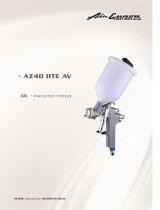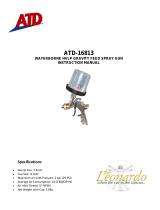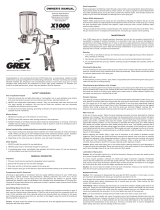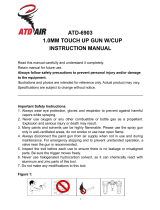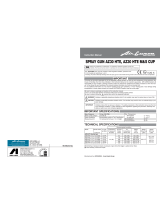Page is loading ...

- 1 -
INSTRUCTION MANUAL
HVLP Spray Gun
Be sure to observe warning s and cautions in this instruction manual.
If not, it can cause paint ejection and serious bodily injury by drawing organic solvent.
Be sure to observe following marked items which are especially important.
Indicates a potentially hazardous situation which, if not avoided, may result in serious injury or loss of
life.
Indicates a potentially hazardous situation which, if not avoided, may result in minor or moderate injury
or property damage.
Indicates notes which we ask you to observe. The safety precautions in this instruction manual are
the minimum necessary conditions. Follow national and local regulations regarding fire prevention,
electricity and safety as well as your own company regulations.
Symbol Marking on the Spray Gun:
II 2 G Ex h X
This ANEST IWATA spray gun complies
with 2014/34/EU Directive relating to
equipment and protective systems
intended for use in explosive potentially
atmospheres.
II 2 G Ex h IIB T6 Gb X
T
Amb
+5°C +40°C
Complies
with
European
Directive
Specific
Marking for
Explosion
Protective
Group II
(Surface)
Category
(Zone 1&2)
Type of
Atmosphere
(GAS)
Ignition
Protection
(not applied)
Explosion
Group
(Ethylene)
Temperature
Class
(≤85°C)
Explosion
Protection
level
(EPL)
Additional
conditions:
Any static
Electricity should
be discharged
and needs to be
diverted to the
ground via a
conductive air
hose not
included.
Ambient
Temperature
Important specifications
Max. Pressure 0.70MPa / 7.0bar / 100psi
Noise level 80dB(A)
Spray condition Recommended
Measuring point 1mbackwards from spray gun, 1.6m height
Max. temperature Atmosphere: 5°C~40°C(41°F~104°F) Air and Fluid: 5°C~43°C(41°F~109°F)
*1.Atomizing air pressure means air pressure at spray gun inlet when trigger is pulled and air flows.
Important
Never connect pressure feeding paint except pressure feed type spray gun.
Main specifications
Model
Type of
feed
Fluid nozzle
Air cap assyMark
Recommended condition
Air consumption
l/min (cfm)
Pattern width
mm (in)
Air & fluid
connection
Mass
g (lbs.)
Nozzle orifice
Φ mm (in)
Mark
*1
Atomizing air
pressure
MPa (bar / PSI)
Air pressure
inside air cap
MPa (bar / PSI)
Fluid output
ml/min
WIDER2L-10G2P
Pressure
1.0(0.039)
W2L WIDER2L-G2
0.20
(2.0/ 28)
0.07
(0.7 / 10)
300
470(16.6)
250( 9.8)
Air
G1/4
(NPS1/4)
Fluid
G3/8
(NPS3/8)
375
(0.83)
-12G2P 1.2 (0.047) 500 300(11.8)
-14G2P 1.4 (0.055) 500 300(11.8)
WIDER2L-2-10G2P 1.0 (0.039)
W2L-2 WIDER2L-2-G2
100
430 (15.2)
330(13.0)
-12G2P 1.2 (0.047) 130 350(13.8)
This manual contains IMPORTANT
WARNINGS and INSTRUCTIONS.
Equipment in this manual is exclusively for
painting purposes.
Do not use for other purposes.
The operator shall be fully conversant with
the requirements stated in this instruction
manual including important warnings,
cautions and operation and correct handling.
Read and understand the instruction
manual, before use and retain for reference.
Fluid nozzle – Fluid needle assy combination
Model Fluid nozzle Fluid needle assy
Orifice Φ mm (in) Mark Mark
WIDER2L-10G2P Φ 1.0 (0.039) / W2L / 10
12H WIDER2
WIDER2L-12G2P Φ 1.2 (0.047) / W2L / 12
WIDER2L-14G2P Φ 1.4 (0.055) / W2L / 14 15HWIDER2
WIDER2L-2-10G2P Φ 1.0 (0.039) / W2L-2 / 10
12H WIDER2
WIDER2L-2-12G2P Φ 1.2 (0.047) / W2L-2/ 12

- 2 -
■
Parts list
◆ Marked parts are wearable parts.
◎ When ordering parts, specify spray gun’s model, part name with ref. No. and marked No. of air cap assy, fluid nozzle and fluid needle.
◎ When replacing fluid nozzle or/and fluid needle, please replace both fluid nozzle and fluid needle assy together.
◎ When receiving the spray gun, make sure that it has not been damaged during transport or storage and also check that all the
above contents are inside the box.
■
Safety precautions
Fire and explosion
1. Spark and open flames are strictly prohibited.
Paints can be highly flammable and can cause fire.
Avoid any ignition sources such as smoking, open flames, electrical goods, etc.
2. Never use the following HALOGENATED HYDROCARBON SOLVENTS
which can cause cracks or dissolution on spray gunbody (aluminum) by chemical reaction.
unsuitable solvents:methyl chloride, dichloromethane, 1.2-dichloroethane,carbon tetrachloride, trichloroethylene, 1.1.1-trichloroethane
(Be sure that all fluids and solvents are compatible with spray gun parts. We are ready to supply a material list used in the product)
3. Securely ground spray gun by using air hose with built-in ground wire.
Ground wire should have less than 1MΩ resistant. Periodically check the ground for continuity.
Insufficient grounding can cause fire or explosion due to static electric sparking.
Improper use of equipment
1. Never point spray gun toward people or animal.
If done, it can cause inflammation of eyes and skin or bodily injury.
2. Never exceed maximum operating pressure or temperature.
3. Be sure to release air and fluid pressures before cleaning, disassembling or servicing.
If not, remaining pressure can cause bodily injury or property damage.
To release pressure, first shut off the supply of compressed air and fluid to the spray gun.
Then squeeze trigger, while the spray is pointed in a safe direction.
4. Tip of fluid needleand tip of fluid nozzlehas a sharp point.
Avoid touching the tipof the fluid needle or fluid nozzle during maintenance to prevent injury.
Protection of human body
1
.
Use only in a well-ventilated area (such as in a spray booth).
If not, poor ventilation can cause organic solvent poisoning and fire hazard.
2. Always wear protective gear (safety glasses, mask, gloves).
If not, paint, solvents, etc., can cause irritation of eyes and skin.
If you feel something wrong with eyes or skin, immediately see a doctor.
3. Wear earplugs if necessary.
Noise level can exceed 80dB(A), depending on operating conditions and painting site
4. If operators pull the trigger many times during use, it may cause carpal tunnel syndrome.
Be sure to take a rest if you feel tired.
Other precautions
1. Never alter this spray gun.
If done, it can cause insufficient performance and failure.
2. Only enter the working areas of other equipment (robots, reciprocators, etc.) after machines have safely been shut down.
If not, contact with them can cause injury.
3. Never spray foods or chemicals through this spray gun.
If done, it can cause accident by corrosion of fluid passages or adversely affect health by mixed foreign matter.
4. If something goes wrong, immediately stop operation and find the cause. Do not use again until you have solved the problem.
No.
Description
Q’ty
No.
Description
Q’ty
1
Air cap assy
1
9
Fluid needle spring assy
1
◆ 2
Nozzle needle assy
1
10
Fluid Adj. knob
1
・
Fluid nozzle
◆
11
Air valve shaft
1
・
Fluid needle
12
Air Adj. assy
1
◆
3
Needle packing set
1
13
Trigger assy
1
4
Pattern Adj. assy
1
14
Trigger stud assy
1
5
Air valve seat assy
1
15
Brush
1
accessories
◆
6
Air valve
1
7
Air valve spring
1
8
Fluid Adj. guide assy
1

- 3 -
■
How to connect
・ Use clean air filtered through air dryer and air filter. ······ If not, dirty air can cause painting failure.
・ Beforeusingthespray gun for the first time, clean fluid passages withthinner toremove rust preventive oil.
If notcleaned, therust preventive oil can cause paint failure,such as fish eyes.
・ Firmly connect hose or cupto spray gun. ······ If not, disconnection of hose ordrop of cup can cause bodily injury.
Step1. Connect an air hose to air nipple tightly.
Step2. Connect a fluid hose or a container to fluid nipple tightly.
Step3. Flush the spray gun fluid passage with a compatible solvent.
Step4. Pour paint into container, test spray and adjust fluid output as well as pattern width.
■
Maintenance and inspection
・ First release air and pressure fully according to item No. 3 of “Improper use of equipment”of WARNING on page 2.
・ Only an experienced person who is fully knowledgeable of the equipment should perform maintenance and inspection.
・ Use neutral cleaner: pH value shall be 6 to 8, otherwise could cause corrosion.
・ Only use genuine ANEST IWATA parts for any maintenance or repairs.
Step-by-step procedure
1. Pour remaining paint to another container. Clean fluid passages and air cap assy.
Spray a small amount of thinner into fluid passages to clean them.
1. Incomplete cleaning can result in poor spray pattern and contaminated paint.
It is especially important clean the gun fully and promptly after using two-component paint.
2. Clean each section with brush soaked with thinner and wipe out with waste cloth.
2. Soaking whole spray gun in solvent may cause spray gun malfunction. Also soaking air
cap assy. itself for extended period may cause a defective spray pattern.
When cleaning, never scratch the air cap assy., fluid nozzle, or fluid needle.
Avoid touching or damaging the tip of the fluid nozzle or needle.
3. Before disassembly, fully clean fluid passages.
Remove fluid nozzle, using a ring spanner, box wrench or optional accessory spanner
(code 93538601)
3. During disassembly, avoid scratching the needle seating surface.
Either first remove the fluid needle or hold the trigger back while removing the fluid nozzle,
to protect the seating surface.
4. If you need to adjust fluid needle packing set, first tighten it by hand (with fluid needle in
place). Then tighten it further about 1/6 turn (60-degree) by spanner.
When you remove needle packing set, do not leave the plastic tip of the packing in the
spray gun body.
4. If you tighten the fluid needle packing set too much, fluid needle will not move smoothly,
resulting in paint leakage from tip of the fluid nozzle. Try to adjust it carefully while pulling
the trigger and confirming smooth movement of the fluid needle.
If you tighten it too much, first fully loosen it and then retighten again carefully.
5. To assemble the air valve, first assemble the air valve, air valve spring, and fluid adj. guide
assy. together. Next, insert fluid needle into fluid adj. guide assy., then fit it to spray gun
body and screw fluid adj. guide assy. in.
5. If you try to fit air valve spring and air valve to the spray gun body without the fluid
needle, the air valve may not be fitted correctly and the packing inside fluid adj. guide
assy. can be damaged.
6. Before assembling the pattern adj. assy. or air adj. assy. back on to the gun body, fully turn
the adjustment knobs counterclockwise to open. Once in the gun body the pattern adj.
knob and air adj. knob can be tightened.
6. If pattern adj. knob or air adj. knob is not fully opened when tightening into gun body, the tip
of it can contact and damage the seating surface.
7. When you assemble the needle spring on the fluid needle, the plastic tip should be on the
opposite side as the fluid needle tip.
7. If plastic tip is on the wrong side, it may not operate normally. Incorrect installation of the
needle spring may cause a heavy trigger pull.
Where to inspect
Parts replacement standard
1. Each hole passage of air cap assy and fluid nozzle Replace if it is crushed or deformed.
2. Packing and O ring Replace if it is deformed or worn out.
3. Leakage from seating surface between fluid nozzle and fluid needle
Replace them if leakage does not stop after fully cleaning the fluid nozzle and needle.
If you replace the fluid nozzle or fluid needle only, ensure they fully match and confirm that
there is no leakage.
Fluid (Gravity)
Fluid nipple
Fluid
(Suction / Pressure)
Air
Air nipple
Fluid needle
Nee dle spring assy
Plastic tip

- 4 -
■
Troubleshooting
Spray Pattern
Problems
Remedies
Fluttering
1. Air enters between fluid nozzle and tapered seat ofspraygun body.
2. Air is drawn from fluid needle packing set.
3. Air enters at fluid container fitting nut or fluid hose joint.
1. Remove fluid nozzle to clean seat. If it is damaged, replace nozzle.
2. Tighten fluid needle packing.
3. Fully tighten joint section.
Crescent
1. Paint buildup on air cap assy. partially clogs horn holes.
Air pressure from both horns differs.
1. Remove obstructions from horn holes with attached brush.
But do not use metal objects to clean horn holes.
Inclined
1. Paint buildup or damage on fluid nozzle circumference and air cap assy.
center.
2. Fluid nozzle is not properly fitted.
1. Remove obstructions.
Replace if damaged.
2. Remove fluid nozzle and clean seat section.
Split
1. Paint viscosity too low.
2. Fluid output too high.
3. Pattern air pressure is too high.
1. Add paint to increase viscosity.
2. Turnfluid adj. knob clockwise to reduce fluid output.
3. Turn pattern adj. assy.clockwise to reduce pattern air pressure.
Heavy Center
1. Paint viscosity is too high.
2. Fluid output is too low.
1. Add thinner to reduce viscosity.
2. Turn fluid adj. knob counter-clockwise to increase fluid output.
Spit
1. Fluid nozzle and fluid needleare not seated properly.
2. The first-stage travel of trigger (when only air discharges) decreases.
3. Paint buildup inside air cap assy.
1. Clean or replace fluid nozzle and fluid needle assy..
2. Replace fluid nozzle and fluid needle assy.
3. Clean air cap assy.
R1: retighten R2: adjust R3: clean R4: replace parts
Problem
Where it
occurred
Parts to be checked Cause
Remedy
R1 R2 R3 R4
Paint leaks
Fluid nozzle
Fluid nozzle~ Fluid needle
Dirt,damage, wear on seat 〇 〇
Loose fluid needle adj. knob 〇
Wearon needle spring 〇
Fluid nozzle~ Spray gun body
Insufficient tightening 〇
Dirt or damage on seat 〇 〇
Needle packing set
Fluid needledoes not return due to packing set too tight 〇 〇
Fluid needledoes not return due to paint buildup on fluid needle 〇 〇
Needle packing set
Needle packing set
~ Fluid needle
Wear 〇 〇
Needle packing set Insufficient tightening 〇
Paint does not
comeout
Tip ofspray gun
Fluid adj. knob Insufficient opening 〇
Tip hole of fluid nozzle
Clogged 〇
Needle packing set
~ Fluid needle
Clogged 〇 〇
Insufficient tightening 〇
Air leaks
(from tip of air cap
assy)
Air valve&
Air valve seat assy
Air valve Dirt or damage on seat 〇 〇
Air valve seat assy
Dirt or damage on seat 〇 〇
Wear on air valve spring 〇
■
How to operate
・ To achieve the recommended 10 PSI air pressure inside the air cap, first fully open the pattern adjustment.
Then while pulling the trigger, set the air pressure at the gun inlet to that shown in the previous specifications table.
・ Recommended paint viscosity differs according to paint property and painting conditions.
18 to 25 sec. / Ford cup#4 is recommendable.
・ Keep fluid output as small as possible to the extent that the job willnot be hindered.
It will lead to better finishing with fine atomization.
・ Set the spray distance from the spray gun to the work piece as near as possible within the range of 100~250 mm (3.9~9.8in).
・ The spray gun should be held so that it is perpendicular to the surface of the work piece at all times.
Then, the spray gunshould move in a straight and horizontal line. Arcing the spray gun causes uneven painting.
・
3176, Shinyoshida-cho, Kohoku-ku, Yokohama, 223-8501, Japan
Manual No. T942-00
Code No. 03014430
100~250 mm
(3.9~9.8in)

- 5 -
Residual Risk Map Requiring Protective Measures by Machine Users
(Abbreviated Name: Residual Risk Map)
Product model: "Spray gun :WIDER1L / WIDER2L"
2019/11/28 Create
ANEST IWATA Corporation
※ Be sure to read and understand the instruction manual before using the product. This document is a reference material in the instruction manual and must not be
used with only an understanding of the contents of this document.
Residual risk is classified and described according to the following definitions
DANGER Contents that are likely to cause death or serious injury if protection measures are not implemented.
WARNING Contents that may cause death or serious injury if protection measures are not implemented.
CAUTION Contents that may cause minor injury if protection measures are not implemented
Symbols and numbers shown in the figure correspond to those described in the "List of Residual Risks" of the Product. Refer to the List of Residual Risks for details of each
residual risk.
Residual risk that is not identified on the machine
DANGER
―
WARNING No.3 , No.5 , No.6 , No.7 , No.8 , No.9
CAUTION ―
Location
A
DANGER ―
WARNING No.1,No.10
CAUTION ―
Location
B
DANGER ―
WARNING No.2
CAUTION ―
Location
C
DANGER ―
WARNING No.4
CAUTION ―
Location
D
DANGER ―
WARNING ―
CAUTION No.11
Residual risk

- 6 -
List of residual risks requiring protection measures by machine users
(Abbreviated Name: List of Residual Risks)
Product model: " Spray gun :WIDER1L / WIDER2L"
2019/11/28 Create
ANEST IWATA Corporation
※ Be sure to read and understand the instruction manual before using the product. This document is a reference material in the instruction manual and must not be
used with only an understanding of the contents of this document.
※ 1 "degree of hazard" is classified and described according to the following definitions
DANGER Contents that are likely to cause death or serious injury if protection measures are not implemented.
WARNING Contents that may cause death or serious injury if protection measures are not implemented.
CAUTION Contents that may cause minor injury if protection measures are not implemented
※2 The symbol shown as "Location on machinery" is the number of the machine section on the Residual Risk Map of the Product. See Residual Risk Map for specific
points on the machinery.
No.
Operatio
nal
Phase
Works
Qualifications
and Training
required for
the work
Location on
the
machinery
*2
Harm
Degree
*1
Type of Harm
Protective measure protective
measure performed by the
machinery user
Instruction
Manual
Referenced
page
1
Use
Preparation
work
During work
― A
Warning
A wrong connection between the air joint
and the paint joint may cause paint to spout
from an unexpected place and hit the
operator.
To provide personal protective
equipment
P2
2 Use All
―
B Warning
Ignition and fire caused by static electricity
Use of a hose with a ground and
confirmation of ground
P2
3
Use and
mainten
ance
During work,
decompositio
n and rinse
― Default Warning
Organic solvents, etc., may come into
contact with the eyes and skin, causing
irritation.
To provide personal protective
equipment
P2
4 Use During work
―
C Warning
Tenosynovitis due to repeated pulling of the
trigger
Moderate rest P2
5 Use All
―
Default Warning
Fire, electrical appliances, etc. ignite, and fire
generatings.
Strict ban on the use of fire P2
6
Use
Preparation
work
During work
― Default
Warning
Supply at specified pressure or higher, paint
spouts from unexpected places, hitting
human body or eyes, blindness
To provide personal protective
equipment
P2
7
Use and
mainten
ance
Preparation
work
During work
― Default
Warning
The product is modified, parts other than
genuine parts are used, and an unexpected
failure or accident generatings.
No modification
Use of genuine parts
P2
8
Use
Preparation
work
During work
― Default
Warning
The patient stayed in a location where noise
such as blowing air was generated for a
long time, resulting in hearing loss.
Use of earplugs is recommended. P2
9
Use and
mainten
ance
During work,
decompositio
n and rinse
― Default Warning
Organic solventpoisoning Due to inhale of
solvent and paint mist
To provide personal protective
equipment
Work in painting booths, etc.
P2
10
Use and
mainten
ance
Preparation
work
During work
― A Warning
If the hoses are triad to be disconnected
under pressurized condition, paint, cleaning
liquid, air, etc. are spouted out and injured.
To provide personal protective
equipment
Remove residual pressure
P2
11
Mainten
ance
Preparation
work
―
D Caution
Needle valve piercing with sharp corners
To provide personal protective
equipment
P2
/
